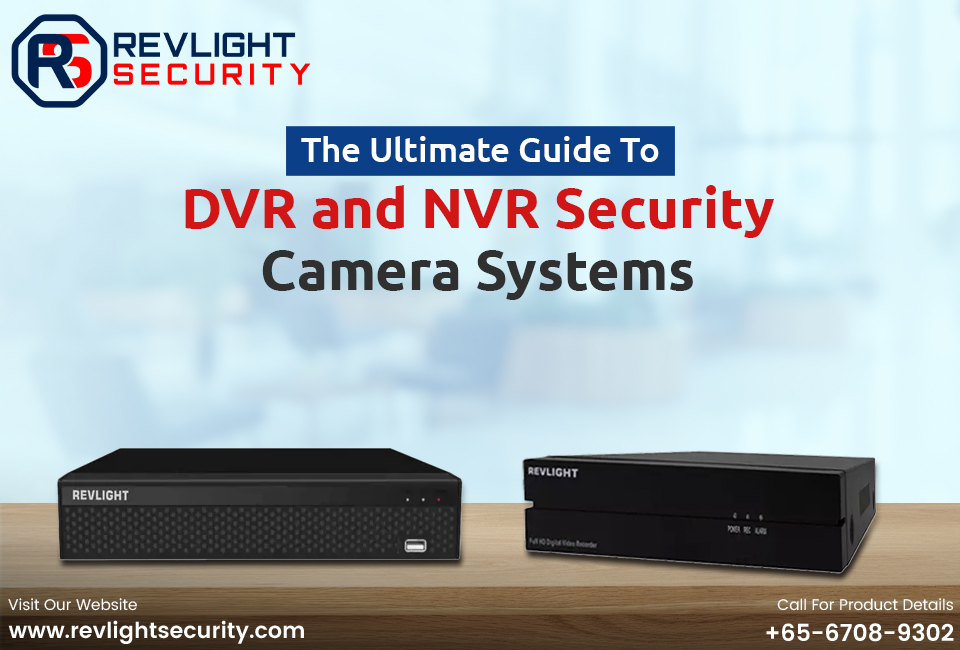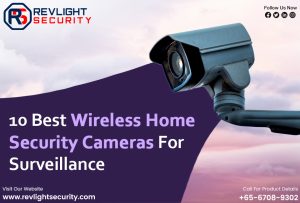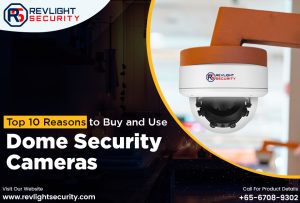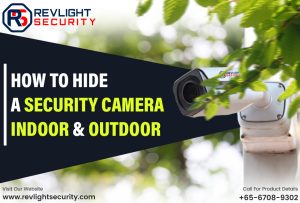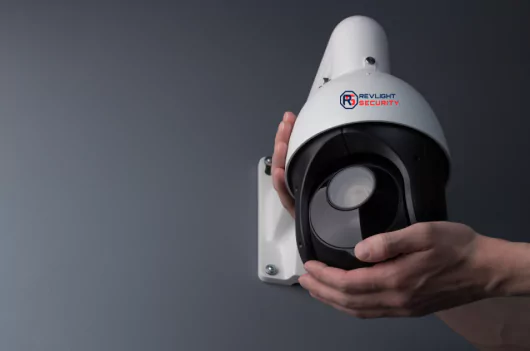We live in an era when security is not just a need but a necessity, and you need a reliable security solution for your home and business alike. Security cameras deter potential intruders and serve as invaluable evidence whenever an accident occurs. Now that technology is advancing, the need for modern surveillance devices has increased.
You do not just need the best CCTV cameras but video recorders also play an important role. This blog highlights the two types of recorders modern-day security cameras use- NVR (Network Video Recorder) and DVR (Digital Video Recorder) and their major differences.
What Will You Learn About DVR and NVR Security Systems?
The NVR and DVR security cameras are fundamental parts of today’s surveillance industry, offering distinct features, benefits, and services. Read this blog, and by the end of this content, you’ll learn about the following:
- What are NVR and DVR security systems
- How DVR and NVR systems function
- The key differences between NVR and DVR security systems
- The pros and cons of each system
- Suitable scenarios for each system
- Which one is the best fit for your needs
Now, dive right in and select the best CCTV camera system for your security needs after you understand each aspect properly.
What Is A NVR?
NVR, or Network Video Recorder, is a type of recorder used for digital Internet Protocol (IP) camera systems. This is a new technology-enabled by an advanced version of IP cameras. The NVR security cameras encode and process the video data on their own and stream it to the recorder to store and view remotely. Some NVR systems are wireless, whereas others use Ethernet cables for processing data.
How Does an NVR Security System Work?
A Network Video Recorder system uses digital IP cameras and works in the following manner:
- The IP Camera captures video and transmits it digitally over an Ethernet network.
- The NVR unit receives this digital video directly from the camera to store on a hard drive, or cloud storage.
These systems offer superior video quality and flexibility. These are the best fit for modern security applications. Some examples of such camera systems from Revlight Security include:
Under our IP Camera Packages, you can check our detailed range of IP cameras with 4, 8, 16, or 32 CHANNEL NVR recorders and make your homes and businesses extra safe with full-day monitoring.
What Is A DVR?
A DVR or Digital Video Recorder is a type of recorder used with analog security cameras. Analog cameras can not process the video on their own and need an external unit for digital encoding of the recorded data and its further storage. A CCTV DVR system does the task by encoding the signal and storing it to decode for remote viewing on demand.
How Does A DVR Security System Work?
A security camera DVR system processes data from analog cameras in the following way:
- DVR system uses an analog camera that captures video footage,
- The captured video is transmitted to the DVR unit using coaxial cables.
- The DVR unit converts the analog signal into digital format.
- This digital format is then stored on a hard drive.
The DVR camera systems have been in the market for years and are a popular industry choice for basic home security systems. Revlight Security also has some great analog cameras that use such DVRs to record & store data like:
Purchase our Analog Camera packages and make your homes more secure with the best DVR security system. Use our products smartly to keep your personal space protected.
Comparing DVR and NVR Security Systems
If you are still unsure about selecting between DVR and NVR security cameras, this comprehensive comparison will help. Below, we delve into various technological aspects, specifications, and features to provide a clear understanding of each system’s offerings.
Camera Compatibility
- DVR systems are more compatible with Analog cameras, which capture video but can not store or process the recorded information and require digital data conversion. A Digital Video Recorder is used in such systems for data processing,
- NVR systems, on the other hand, are most compatible with IP cameras, which offer direct digital storage over a network cable or wireless network. They can transfer data without any need for encoding or decoding in different formats. Due to their use of IP cameras, NVR security systems are the most trending in the security industry.
Cables Required For Transmission
- The analog cameras connect to a DVR camera system through coaxial cable, which can run up to 1000 meters at most. These cables cannot supply power to the camera, so two cables are required for each camera.
- IP Cameras connect to the recorder via Ethernet cables when they are not wireless. Some security camera systems with NVR come with a PoE (Power over Ethernet) connection, resulting in only one cable for power, audio, and video. PoE is not available on all IP cameras and may require an Ethernet connection with a power supply.
Recorder
- DVR recorders typically rely on AD encoders, which help process raw video from analog cameras to digitally viewable footage. These systems also require you to connect every camera directly to the recorder.
- NVR recorders are only used for storage and viewing the recorded footage. They are not used for data processing as an IP camera itself does this task before transmission.
Audio Support
- A security camera DVR recorder does not have audio support. The coaxial cables can not natively transmit audio signals. To support the audio, an added RCA connection is required. The DVRs also have limited audio input ports, limiting the total number of cameras that record sound.
- The NVR camera system, on the other hand, can transmit audio natively through the Ethernet cables. The IP camera with a microphone can connect to an NVR system to record audio and send it to the NVR directly.
Storage Capacity
- Even the best DVR security system stores a video on the hard drive within their DVR unit. They can only store based on the storage capacity of the DVR, and you have to replace the hard drive or add another DVR unit to expand its storage capacity. (These only offer local storage)
- NVR security systems offer both local and cloud storage options on the NVR unit. You can expand the storage capacity as required with NAS (network-attached storage) devices or additional hard drives.
Video, Image And Audio Quality
- DVR systems use analog cameras, which have lower image & video resolutions because the camera signal takes time to process. The images produced by such cameras lack sharpness and detail, basic color accuracy, and poor low-light performance.
- These DVR cameras also have limited support for audio recording and use analog audio input, which means the quality is basic, with plenty of background noise.
- The NVR cameras support higher resolution as they directly transmit digital data and generate clear, crisp images with detail. The color quality is accurate and clearer.
- These NVR system’s audio and video quality is also amazing, with enhanced features and reduced external noise.
Cost & Budget
- The DVR camera units are affordable compared to the NVR units, which cost more, making them a bit out of budget for small business surveillance needs.
- The cable cost for DVR systems increases with the complexity of coaxial cables and their 1000-meter limit. On the oither hand, NVR systems have lower installation costs with simpler ethernet cabling.
- DVR systems maintenance requirements are less complex than NVR systems. In short, NVR cameras increase your budget,
Network Dependency
- The DVR systems operate independently from a network, so they will keep recording even during the network failure.
- An NVR security system can not operate seamlessly without a stable network, as the data is transmitted over an Ethernet cable. The system’s function is affected in case of network disruption.
Network Security
- DVR systems do not require many network security measures making them less prone to attacks related to network ports.
- NVR security camera systems require robust network security measures to prevent unauthorized access and protect data.
Installation Flexibility and Wiring Requirements
- NVR systems utilize Power over Ethernet (PoE) technology to transmit data and power connections over a single cable. Such options make your security systems expandable without increasing potential costs.
- DVR systems typically require separate cables for power and video signals, increasing complexity during installation. So, these offer comparatively less flexibility.
Scalability and Future-proofing Your System
- DVR systems have fixed inputs which limits the number of cameras you can add to your setting. These offer less scalability as the business expands because you need more complex infrastructure settings.
- NVR systems are highly scalable. They can easily accommodate business growth by integrating additional cameras into the network.
The Pros & Cons Of DVR & NVR Camera Systems
After understanding the core differences between NVR and DVR security systems, you must know what are their benefits and disadvantages to decide which one to purchase. Here are the details:
Perks of Digital Video Recorder Systems
- These have generally lower initial costs because of cheaper analog cameras and simpler technology needs.
- They can provide continuous recording even during network outages.
- DVR security systems require a simple setup and are easy to operate.
- These are less vulnerable to network-related issues.
- Such systems are ideal for basic surveillance needs of budget-conscious customers.
Perks of Network Video Recorder Systems
- These generate high-quality videos with superior image resolution and clarity because of digital IP camera transmissions.
- Power over Ethernet technology (PoE) simplifies installation by requiring only one cable for power and data transmission.
- You can add more IP cameras to the network without making significant changes to the infrastructure.
- NVR security cameras can easily integrate with modern technology, such as AI analytics and smart home systems with remote access capabilities.
Demerits of Digital Video Recorder Systems
- The requirement of analog to digital conversion results in lower video quality.
- These do not support audio recording properly.
- Digital Video Recorder Security systems are less compatible with advanced camera features and modern surveillance technology.
- These systems require complex wiring and separate cables for power and video signals.
- The recorders come with a fixed number of channels, which limits their flexibility and scalability.
Demerits of Network Video Recorder Systems
- Their initial cost is higher because IP cameras are more expensive than analog cameras, and network infrastructure is also costly.
- They completely rely on a stable network for optimal performance, and any network issue impacts their recording.
- You need more technical expertise to install and maintain NVR security systems.
- These are more vulnerable to network initiated attacks and other potential cyber threats if not secured properly.
Some Suitable Scenarios For DVR & NVR Surveillance Systems
Many factors affect where you can use and operate an NVR or DVR camera system for real-time monitoring of your homes or businesses. The camera application environments are decided depending on your budget, surveillance needs, and the overall area you need cameras in. Here are a few suitable scenarios for each of these CCTV camera systems:
DVR Security Camera Systems
- Small Businesses
- Residential Use
- Retail Stores
- Legacy Systems
NVR Security Camera Systems
- Large Enterprises
- Commercial Buildings
- Hospitals & Healthcare Facilities
- Educational Institutions
- Smart Homes
- Government and Public Sectors
DVR or NVR- Which one is the best fit for your needs?
Choosing between a DVR or NVR system depends on various factors, You can follow these concluding examples below and make sure which is the perfect fit for your premises and surveillance needs.
Choose A DVR System When,
- Budget is your primary concern, as DVR security cameras are more affordable.
- You do not need high-definition video or audio input or any advanced features.
- You have an existing coaxial cabling environment, as these can be integrated at minimal costs.
- Your premises do not totally rely on network-dependent operations and need continuous recording regardless of network outage.
Choose An NVR System When,
- Generating high-quality videos is as important as recording the day-to-day data for monitoring.
- You are constantly expanding your business and need a scalable camera system for constant monitoring.
- Your premises have smart appliances, and you integrate AI into your day-to-day business.
In simple terms, both NVR and DVR security systems have their own set of qualities and disadvantages. It’s up to your needs which one you must choose. Keep all these things mentioned in mind when you want to select the best security system for your surveillance needs. Asses everything before making a purchase and rely on Revlight Security to get the most reliable security & surveillance systems for your business or residential property.
Make Security Your Top Priority! Choose the right system for your place today…
Read More Blogs:
Long Range Camera 101- A Complete Guide to Enhanced Surveillance
4K vs. 2K vs. 1080p: Choosing the Best Security Camera
What Are the Benefits of CCTV Cameras for Small Businesses?

